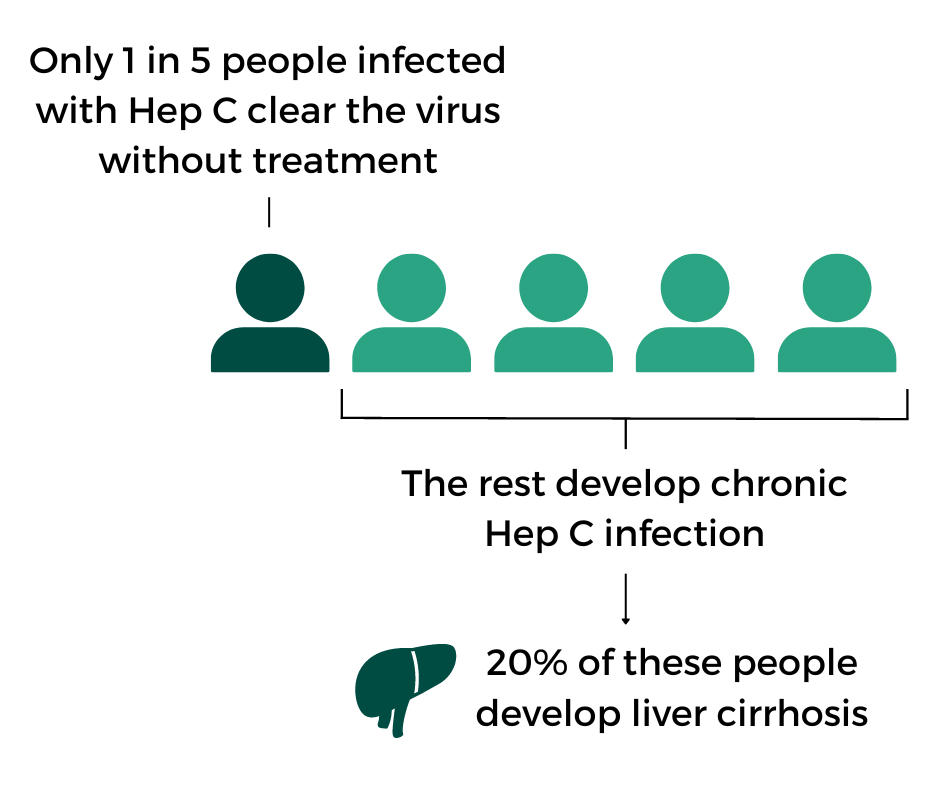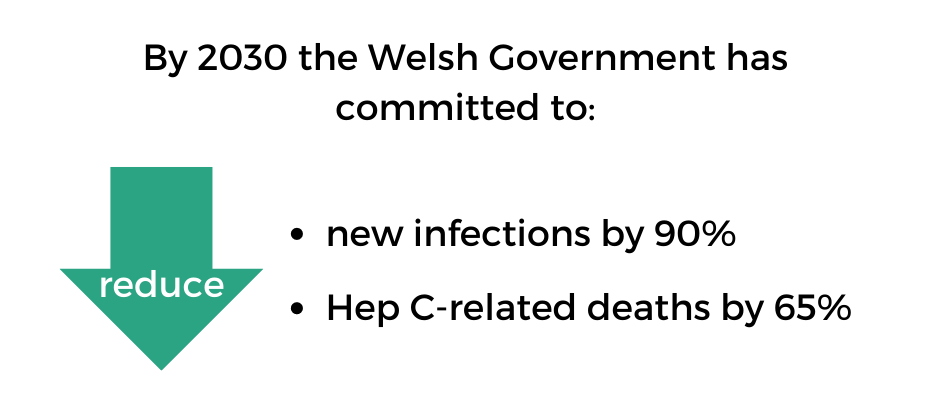It’s been almost six years since the Welsh Government signed up to the World Health Organisation’s (WHO) plan to eliminate Hepatitis by 2030. Despite this, diagnosis and treatment rates in Wales are falling short of where they need to be to meet this target. With Wales set to miss the deadline for eliminating the virus by at least 10 years, decisive action is required to get plans back on track.
The Chief Medical Officer for Wales (CMO), Sir Frank Atherton, announced a renewal of the Welsh Government’s plan earlier this year, and reaffirmed its commitment to the 2030 target. This article focuses on Hepatitis C, looking at progress made so far and the Welsh Government’s latest plans to achieve its goal.
What is Hepatitis C?
The Hepatitis C virus spreads through contact with the blood of an infected person e.g. through use of a contaminated needle. The group at highest risk of infection are people who inject or have previously injected drugs, accounting for nearly 90% of cases.
80% of people infected with the virus are unable to clear it without treatment, leading to chronic Hepatitis C infection. There are an estimated 8,000 people currently living with Hepatitis C in Wales. 1 in 5 of those with long-term infections develops scarring of the liver, known as cirrhosis, which can cause liver failure. Chronic infection can also cause liver disease and cancer.
Most Hepatitis C infections become chronic

Source: Hepatitis C. Public Health Wales.
Although there’s no vaccine to prevent Hepatitis C, the development of new drugs, called ‘directly acting antivirals’, has revolutionised care. These tablets cure almost all infections with minimal side effects. As well as preventing long-term health consequences for the infected individual, treatment also reduces further spread of the disease.
What’s been done so far to tackle Hepatitis C in Wales?
In 2016, the Welsh Government signed up to the WHO plan to eliminate Hepatitis C as a global public health concern by 2030. WHO set targets to decrease new infections and Hepatitis C-related deaths.
The Welsh Government has agreed to the targets set out by WHO to eliminate Hepatitis C by 2030

Source: Hepatitis. World Health Organisation.
The CMO published guidance on achieving this goal in Wales in 2017. This focused on reducing ongoing transmission by pushing testing and treatment, particularly of at-risk groups.
As part of this, Needle and Syringe Programmes (NSPs) provide people who inject drugs with sterile needles to tackle transmission amongst this at-risk population.
Measures were also introduced to monitor and treat infections in Welsh prisons, where 10% of men have been or are currently infected with Hepatitis C. All men in Welsh prisons were tested unless they opted out. Infected individuals were treated at specialist clinics within prisons. These efforts proved successful, with HMP Swansea becoming the first remand prison in the UK to eliminate Hepatitis C in 2019.
Public Health Wales also launched a campaign in 2019 to identify people diagnosed before the latest highly effective treatments were available, and to offer them these.
Can Wales get back on track to meet WHO’s target of elimination by 2030?
Despite these efforts, there have been warnings that Wales is falling behind, from the Senedd and experts including the Hepatitis C Trust, with plans to eliminate Hepatitis C.
An inquiry by the fifth Senedd’s Health, Social Care and Sport (HSCS) Committee published in June 2019, warned that Wales was significantly behind in its efforts, and without urgent action, the elimination opportunity would be lost.
Progress has been further hampered by the COVID-19 pandemic.
Many Hepatitis C-related services were halted during this time, with some yet to return to pre-pandemic levels. According to the Hepatitis C Trust, services were impacted more strongly in Wales than other UK nations. While treatment rates fell markedly in all UK nations during the first wave of the pandemic, treatment initiations in Wales were slower to recover than the rest.
The latest figures, compiled by the public health agencies of each UK nation earlier this year, estimate that 81.7% of diagnosed patients with chronic Hepatitis C received treatment in 2020 in Wales.
However, testing numbers were down. There had only been a 25% reduction in Hepatitis C-related mortality between 2015 and 2020, much lower than the 65% decrease target set by WHO.
Dr Brendan Healy, the Blood-borne Viral Hepatitis Lead for Wales, has stressed that at least 900 patients must be treated in Wales annually to achieve elimination by 2030. However, the latest figures show that only 265 patients began treatment in 2020/21, highlighting the need for a new plan to tackle elimination.
There’s also a disparity between Wales and the rest of the UK in its timeline for elimination, with England and Northern Ireland aiming for elimination by 2025 and Scotland setting an even earlier target of 2024. According to the Hepatitis C Trust;
[…]there is a very real danger of Wales being left behind in the race to achieve hepatitis C elimination without increased action.
What lies ahead?
The quality statement for liver disease was published in November 2022 and sets out the Welsh Government’s future vision for liver services in Wales for the next decade, which includes Hepatitis B and C.
Earlier this year the CMO acknowledged that if Hepatitis C testing and treatment levels in Wales don’t improve, elimination by 2030 won’t be possible, and may not happen until 2040 at the earliest.
Addressing these concerns, he announced targeted plans to tackle infections, up to 2024, and confirmed:
The Welsh Government remains committed to eliminating hepatitis B and C as a public health threat by 2030 at the latest.
The CMO’s plan established 13 action points, drawing on recommendations made in global guidance on eliminating viral hepatitis, produced by the Seventy-Fifth World Health Assembly and the World Health Organization in 2022.
He stated that restoring related care services to pre-pandemic levels and beyond would be prioritised. He also announced an expansion of care provided in primary care and outside of the healthcare environment entirely, in harm reduction units or the prison service.
To enact these plans, health boards will submit Joint Recovery Plans addressing how they’ll get back on course with elimination efforts.
The Hepatitis B and C Elimination Programme Oversight Group has been set up by the Welsh Government to monitor progress against the 13 action points. The group will include key stakeholders, including Public Health Wales and the Hepatitis C Trust, and will report regularly to the CMO and the Minister for Health and Social Services. A progress update is expected later in the year.
The Hepatitis C Trust, responded positively to the plans stating;
It is good to see Wales taking important steps to get back on track towards eliminating HCV by 2030. The pandemic presented many challenges to the elimination agenda but even prior to this Wales was falling behind. The 13 actions set out by the Welsh Government are a welcome plan to accelerate progress […]
Article by Ailish McCafferty, Senedd Research, Welsh Parliament
Senedd Research acknowledges the parliamentary fellowship provided to Ailish McCafferty by the Medical Research Council which enabled this Research Article to be completed.






